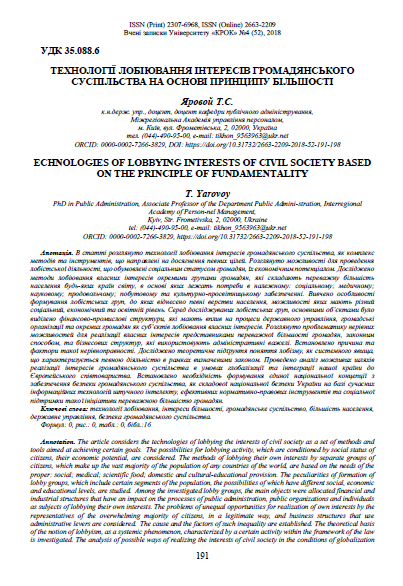ТЕХНОЛОГІЇ ЛОБІЮВАННЯ ІНТЕРЕСІВ ГРОМАДЯНСЬКОГО СУСПІЛЬСТВА НА ОСНОВІ ПРИНЦИПУ БІЛЬШОСТІ
DOI:
https://doi.org/10.31732/2663-2209-2018-52-191-198Ключові слова:
технології лобіювання, інтереси більшості, громадянське суспільство, більшість населення, державне управління, безпека громадянського суспільстваАнотація
В статті розглянуто технології лобіювання інтересів громадянського суспільства, як комплекс методів та інструментів, що направлені на досягнення певних цілей. Розглянуто можливості для проведення лобістської діяльності, що обумовлені соціальним статусом громадян, їх економічним потенціалом. Досліджено методи лобіювання власних інтересів окремими групами громадян, які складають переважну більшість населення будь-яких країн світу, в основі яких лежать потреби в належному: соціальному; медичному; науковому; продовольчому; побутовому та культурно-просвітницькому забезпеченні. Вивчено особливості формування лобістських груп, до яких віднесено певні верстви населення, можливості яких мають різний соціальний, економічний та освітній рівень. Серед досліджуваних лобістських груп, основними об’єктами було виділено фінансово-промислові структури, які мають вплив на процеси державного управління, громадські організації та окремих громадян як суб’єктів лобіювання власних інтересів. Розглянуто проблематику нерівних можливостей для реалізації власних інтересів представниками переважної більшості громадян, законним способом, та бізнесових структур, які використовують адміністративні важелі. Встановлено причина та фактори такої нерівноправності. Досліджено теоретичне підґрунтя поняття лобізму, як системного явища, що характеризується певною діяльністю в рамках визначеними законом. Проведено аналіз можливих шляхів реалізації інтересів громадянського суспільства в умовах глобалізації та інтеграції нашої країни до Європейського співтовариства. Встановлено необхідність формування єдиної національної концепції з забезпечення безпеки громадянського суспільства, як складової національної безпеки України на базі сучасних інформаційних технологій штучного інтелекту, ефективних нормативно-правових інструментів та соціальної підтримки такої ініціативи переважною більшістю громадян.
Завантаження
Посилання
Структура статків населення світу станом на 2017р., Науково-дослідний інститут Credit Suisse, URL: https://www.credit-suisse.com/corporate/en/articles/news-and-expertise/global-wealth-pyramid-decreased-base-201801.html (дата звернення 18.09.2018).
Нерівність прибутків та показники бідності, Сайт статистики Європейського союзу. URL: https://ec.europa.eu/eurostat/documents/7894008/8256843/Flash-estimates-of-income-inequalities-and-poverty-indicators-experimental-results-2017.pdf (дата звернення 18.09.2018).
Уровень жизни // Официальный сайт Федеральной службы государственной статистики. – URL: http://www.gks.ru/wps/wcm/connect/rosstat_main/rosstat/ru/statistics/population/level/# (дата звернення 18.09.2018).
Проект Закону про лобізм №5144 від 20.09.2016, 5 сесія VIII скликання, Включено до порядку денного: 1852-VIII від 21.02.2017, автори: Князевич Р. П., Власенко С.В. та ін. URL:
http://w1.c1.rada.gov.ua/pls/zweb2/webproc4_1?pf3511=60052(дата звернення 18.09.2018).
Проект Закону про правовий статус груп об'єднаних спільними інтересами (лобістських груп) у Верховній Раді України № 3188-1 від 03.11.1999, Сесія реєстрації: 4 сесія III скликання, автори: Ю. Сахно, О. Задорожній та ін. URL: http://w1.c1.rada.gov.ua/pls/zweb2/webproc4_1?pf3511=7028 (дата звернення 18.09.2018).
Cox T. Democratisation and the Growth of Pressure Groups in Soviet and Post-Soviet Politics. Richardson J.J. [ed.] Pressure Groups. Oxford University Press, 1993. P. 71-86.
Сергєєв В. Лобізм в Україні: можливості неурядових організацій. Політичний менеджмент: журнал. 2007. №3. С. 88–95.
Нестерович В. Технологія опосередкованого лобіювання: тенденції розвитку. Вибори та демократія : журнал. 2007. №3. С. 23-28.
Базілевич Д. Лобіювання в Україні: запрошення до дискусії. URL: http://lobbying.in.ua/content/lobyuvannyav-ukr/zaproshennya-do-diskus (дата звернення 18.09.2018).
Конституція України (Відомості Верховної Ради України (ВВР), 1996, № 30, ст. 141), Документ 254к/96-ВР, чинний, поточна редакція — Редакція від 30.09.2016, підстава - 1401-VIII. URL: http://zakon.rada.gov.ua/laws/show/254%D0%BA/96-%D0%B2%D1%80 (дата звернення 18.09.2018).
Токвиль А. де. Демократия в Америке. М.: Прогресс, 1994. 560с.
Россия и США: становление отношений. 1765-1815 : документы и материалы. Москва : Наука, 1980. 752 с.
Khoroshkovsky V. The Strategic Choice. Politics and the Times. 2003. № 4. P. 3-11.
Смирнова А. В. Понятие «Технология» в профессиональной деятельности учителя. URL: https://moluch.ru/archive/62/9364/ (дата звернення 18.09.2018).
Mitcham C., Shatzberg E. Op. cit. P. 32.
Beckmann J. Entwurf der allgemeinen Technologie. Vorrath Kleiner Anmerkungen über machinerey gelehrte Gegenstände. Göttingen, 1806.


